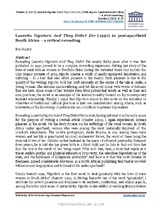| dc.contributor.author | Hunter, Eva | |
| dc.date.accessioned | 2018-08-17T12:20:08Z | |
| dc.date.available | 2018-08-17T12:20:08Z | |
| dc.date.issued | 2017 | |
| dc.identifier.citation | Hunter, E. (2017). Lauretta Ngcobo’s And They Didn’t Die (1990) in post-Apartheid South Africa – a critical rereading. Scrutiny2, 22(1): 6-15. | en_US |
| dc.identifier.issn | 1812-5441 | |
| dc.identifier.uri | http://dx.doi.org/10.1080/18125441.2017.1345381 | |
| dc.identifier.uri | http://hdl.handle.net/10566/3951 | |
| dc.description.abstract | Rereading Lauretta Ngcobo’s And They Didn’t Die nearly thirty years after it was first published in 1990 proved to be a complex, rewarding experience. Setting her story of the lives of rural African women in KwaZulu-Natal during the turbulent times that include the Cato Manor protests of 1959, Ngcobo creates a world of nearly unrelieved deprivation and suffering – in a text that also offers pleasure to the reader. Such pleasure is due to the quality of the writing; Ngcobo took her craft seriously. At the centre of the tale is Jezile, a young woman. She endures much suffering, and yet the novel closes with words of defiance that are hers. Since some of her travails stem from patriarchal beliefs as well as class and race practices, the novel is an example of the intersectionality focused on by contemporary feminist scholarship. Finally, I argue that Ngcobo’s stance in this novel on the retention or otherwise of traditional cultural practices is just one manifestation among others, such as interviews, of the knowledge of politics she can contribute to present day readers. | en_US |
| dc.language.iso | en | en_US |
| dc.publisher | Taylor & Francis | en_US |
| dc.subject | Ngcobo | en_US |
| dc.subject | Rural women | en_US |
| dc.subject | Intersectionality | en_US |
| dc.subject | Post-apartheid | en_US |
| dc.subject | Tradition | en_US |
| dc.subject | Change | en_US |
| dc.title | Lauretta Ngcobo’s And They Didn’t Die (1990) in post-apartheid South Africa – a critical rereading | en_US |
| dc.type | Article | en_US |

